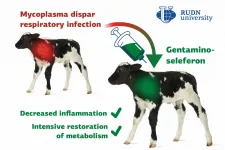(Press-News.org) New research from Trinity College Dublin suggests that older adults can be more focused, less impeded by anxiety and less mentally restless than younger adults. The team at the Trinity College Institute of Neuroscience (TCIN) (today, Wednesday, 10th February, 2021) show that older adults appear to mitigate the negative aspects of cognitive decline by increasing motivation and adopting more efficient strategies to suspend the wandering mind when focus is required.
The study, published in the journal Psychology and Aging (American Psychological Association) is the first to adjudicate between competing theories of age-related mind-wandering dominant in the field. It highlights the influential roles of affective and motivational factors in driving age-related differences in unintentional mind-wandering and provide reasons to be less persuaded by previous cognitive resources accounts.
The human mind has a natural and frequent tendency to wander. In everyday life, our thoughts often stray from the here-and-now. Mind-wandering is broadly defined as the mental state whereby our attention shifts away from a task or our current environment to unrelated and self-generated mental content. Recent research within healthy ageing populations has demonstrated a confusing yet consistent finding of reduced mind-wandering frequency with advancing age.
Although different theories have been suggested to explain this finding, previous studies have been afflicted by varying methodological challenges for capturing incidences of mind-wandering. As such, the neuropsychological mechanisms underlying age-related differences in mind-wandering remain unclear. Further, there is a lack of research exploring the mechanisms underlying different mind-wandering dynamics; specifically, mind-wandering that occurs with and without intention.
Considering the phenomenon of global population ageing, and in light of the reported benefits (e.g. creativity, problem-solving) and costs (e.g. poorer sustained attention and clinical outcomes) of mind-wandering, it is important to investigate the impact of ageing on mind-wandering. Sustaining our attention is an important ability that underlies much of our cognition and its decline is linked with an increased risk of falls, a factor contributing to the loss of independence and reduced quality of life in older adults. Therefore, research on different attentional states is vital for shaping our understanding of the brain and the natural ageing process and may help inform future interventions targeted at promoting healthy ageing.
The 'Dockree Lab' team at TCIN, in a collaboration with Prof Alan Smeaton from Dublin City University, investigated whether the nature and frequency of mind-wandering changed with age, and explored the specific mechanisms underlying unintentional and intentional mind-wandering. They employed a multi-faceted methodological approach whereby healthy younger and community-dwelling older adults completed a series of standardised cognitive and neuropsychological tasks and performed a computerised sustained attention task that periodically asked participants to report on their current mental state. Compared to previous studies, the task was well-suited to measure mind-wandering as the task was non-demanding and presented gradually unfolding targets that placed greater reliance on endogenous attentional control.
Key Findings
Older adults exhibited a lower tendency for mind-wandering, both unintentionally and intentionally, than younger adults. In total, older and younger adults reported mind-wandering 27% and 45%, respectively, in response to the thought probes throughout the task.
Younger and older adults demonstrated similar task performance; although, older adults performed with less variability indicating overall better focus.
Despite poorer performance on standard cognitive tests, older adults exhibited lower levels of anxiety and depression, fewer subjective attentional difficulties, and greater task-related motivation than their younger counterparts.
The analyses also highlight the adaptive qualities of older adults who were able to reduce their unintentional mind-wandering through their lower levels of anxiety and greater task motivation than the more mentally restless younger group. Contrary to executive resource accounts of mind-wandering, the cognitive variables did not further contribute to this model.
The team observed an association between intentional mind-wandering and increased false alarms on the task, which was mediated by more inconsistent responding, particularly in the young who were more restless in their approach. Considering that younger adults' higher variability did not incur a relative cost to their performance compared to older adults, they have more resources available to adaptively switch between focus and more explorative mind-wandering states.
Older adults, on the other hand, exploit greater focus toward the task, with less bias toward mind-wandering. We suggest this is an adaptive quality of successful ageing - when context demands it, older adults suspend the wandering mind to mitigate potential costs.
The team suggests that dispositional and strategic factors be considered in future studies exploring mind-wandering across the lifespan. The research, therefore, highlights the nature and correlates of different mind-wandering dimensions and provides new insight into how unintentional and intentional mind-wandering processes change with age.
Catherine Moran, PhD candidate, School of Psychology and lead author said:
"Age-related cognitive decline in later life represents a leading cause of disease burden and loss of functional independence. Despite these challenges, there is a consistent and perhaps, puzzling finding of reduced mind-wandering with advancing age. Our research, supported by the Irish Research Council, provides new insight into the influence of the natural ageing process on mind-wandering. We highlight the adaptive strategies and positive qualities adopted by older adults that led to a beneficial reduction in their mind-wandering and equivalent performance with younger adults. Dissecting the mechanisms underlying different cognitive processes may be important indications of successful ageing."
Dr Paul Dockree, Associate Professor, Psychology and co-author/lead investigator said:
"'Old and absentminded' is a phrase, which is recognised in common parlance, but it does not hold universal truth. Our research suggests that older adults can be more focused, less impeded by anxiety and less mentally restless than younger adults. Importantly, older adults appear to mitigate the negative aspects of cognitive decline by increasing motivation and adopting more efficient strategies to suspend the wandering mind when focus is required. This research is in keeping with Trinity's Research Theme of Ageing, which promotes a more in depth understanding of cognitive changes as we age, with a view to establishing a more age-friendly and inclusive society."
INFORMATION:
In recent years, three meta-analyses of clinical studies have come to the conclusion that vitamin D supplementation was associated with a reduction in the mortality rate from cancer of around 13 percent. Scientists at the German Cancer Research Center (DKFZ) have now transferred these results to the situation in Germany and calculated: If all Germans over the age of 50 were to take vitamin D supplements, up to 30,000 cancer deaths per year could possibly be avoided and more than 300,000 years of life could be gained - in addition, health care costs could be saved.
For several years now, scientists have been investigating the influence of an adequate supply of vitamin D on the ...
Overfishing, hunting and intensive agriculture and forestry can sometimes contribute to plants and animals becoming endangered. New research from Lund University in Sweden and University of Toronto can now show why this leads to entire populations becoming smaller in size, as well as reproducing earlier. The study is published in the journal PNAS.
Researchers from Lund and Toronto are behind the study conducted on five different species of damselflies. They have studied how different environmental factors affect when and at what size the damselflies begin to reproduce. In the study, the researchers also shed light on how overfishing off the coast ...
COLUMBUS, Ohio - The death of a vampire bat 19 days after giving birth presented scientists studying the animals in 2019 with an unexpected chance to observe a rare event: a female bat's adoption of an unrelated baby.
The researchers had captured common vampire bats in Panama as part of ongoing studies of the formation of cooperative relationships among strangers. The team used infrared surveillance cameras to observe six hours of vampire bat activity spaced over the span of each day.
Two unrelated and unfamiliar female bats were observed forming a social bond based on mutual grooming and food sharing that increased over time. The researchers had named them BD and Lilith.
Lilith ...
Respiratory tract diseases in young animals of the cattle are a big issue for world agriculture and food safety because a bacterium that causes them is resistant to most antibiotics. A team of veterinarians from RUDN University developed and tested a complex preparation called gentaminoseleferon that could help treat respiratory infection in calves. The results of the study were published in the Veterinary World journal.
Bacteria of the genus Mycoplasma cause many infectious diseases in animals, including atypical pneumonia, other respiratory tract conditions, reproductive pathologies, arthritis, keratoconjunctivitis, mastitis, and so on. The genus includes about 200 species of bacteria, and all of them ...
Every day, people die from simple infections even though they have been treated with antibiotics. This is because more and more bacteria have become resistant to the types of antibiotics that doctors can prescribe.
- It's a huge societal problem and a crisis that we must solve. For example, by developing new antibiotics that can defeat the resistant bacteria, says professor of chemistry at the Department of Physics, Chemistry and Pharmacy, University of Southern Denmark, Poul Nielsen.
Resistant bacteria are not only known from pig farms, where it is becoming increasingly difficult to keep the pigsties disease-free. Hospitals are also experiencing with increasing regularity that, for example, infectious diseases cannot be controlled in patients. Thus, ...
Can long-term stress lead to heart attacks? Most people would probably answer in the affirmative, but the scientific evidence of this is scarce. A new study by researchers from Linköping University in Sweden reveals that the levels of the stress hormone cortisol were increased in the months preceding a heart attack. The results, published in Scientific Reports, suggest that long-term stress is a risk factor for heart attacks.
"The levels of the stress hormone cortisol differed between people who have had a heart attack and those not affected. This suggests that cortisol in hair may be a new risk marker for heart attacks. We must take stress seriously", says Professor Tomas Faresjö from the Department of Health, ...
Ruptured abdominal aortic aneurysms (rAAA) are responsible for nearly 2% of all deaths in U.S. men over the age of 65. Endovascular aneurysm repair (EVAR) has emerged as a newer and less invasive alternative to open repair for rAAA, and current guidelines recommend EVAR as a first-line option for treatment of rAAA when certain criteria are met. But researchers from the University of Missouri School of Medicine have discovered that while EVAR is more commonly utilized for rAA, shortens hospital stay and has a lower initial mortality rate, the odds of ...
Researchers at the RIKEN Center for Biosystems Dynamics Research in Japan have discovered a recipe for continuous cyclical regeneration of cultured hair follicles from hair follicle stem cells.
Scientists have been making waves in recent years by developing ways to grow a variety of useful items in laboratories, from meat and diamonds to retinas and other organoids. At the RIKEN Center for Biosystems Dynamics Research in Japan, a team led by Takashi Tsuji has been working on ways to regenerate lost hair from stem cells. In an important step, a new study identifies a population of hair follicle stem cells in the skin and a recipe for normal cyclical regeneration in the lab.
The researchers took fur and whisker cells ...
Experts from the Natural History Museum, The Francis Crick Institute and the Max Planck Institute for the Science of Human History Jena have joined together to untangle the different meanings of ancestry in the evolution of our species Homo sapiens.
Most of us are fascinated by our ancestry, and by extension the ancestry of the human species. We regularly see headlines like 'New human ancestor discovered' or 'New fossil changes everything we thought about our ancestry', and yet the meanings of words like ancestor and ancestry are rarely discussed in detail. In the new paper, published in Nature, experts review our current understanding of how modern human ancestry around the globe can be traced into the distant ...
MINNEAPOLIS/ST.PAUL (02/10/2021) -- University of Minnesota Medical School researchers studied SARS-CoV-2 infections at individual cellular levels and made four major discoveries about the virus, including one that validates the effectiveness of remdesivir - an FDA-approved antiviral drug - as a form of treatment for severe COVID-19 disease.
"Since the start of the COVID-19 pandemic, the way that each individual responds differently to the infection has been closely studied. In our new study, we examined variations in the way individual cells reacted differently to the coronavirus and responded to antiviral treatment," said Ryan Langlois, PhD, senior author of the study, associate professor in the Department ...




